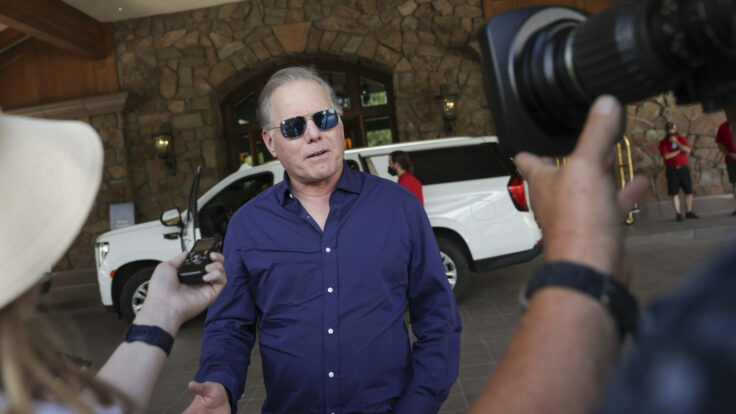Perhaps the greatest mystery in the current sports media ecosystem—beyond the Shohei Ohtani saga, of course—is the denouement of the NBA’s national media rights auction. The timing, of course, is fraught on a number of levels—league play is at an all-time high, as a new generation of international superstars (S.G.A., Wemby, Jokic, Ant-Man) come into their own; the league’s traditional partners are all operating in a complex post-ZIRP media environment; and live sports remain the last bastion of the linear ecosystem. Disney (ABC and ESPN), Comcast (NBC), and Warner Bros. Discovery (TNT and TruTV) all want as many TV games as they can acquire. Sure, they know that their futures will be defined by streaming and free cash flow, but current cash flow optimization models rely on raking in as much money as humanly possible from live sports—the cable fees, advertising, etcetera—pronto.
What makes this NBA negotiation even more fascinating, though, is the presence of the deep-pocketed—in some cases trillion-dollar-plus market capitalization—tech companies. Indeed, while Disney, Comcast, and WBD all have pretty straightforward motivations for landing NBA rights, the tech streamers have very distinct enticements. Representatives from Amazon, Apple, Google, and Netflix have all approached their NBA talks in different ways, which neatly express their ultimate end goal and the manifold value of the NBA product. (They haven’t had formal negotiations yet; the NBA is in the middle of an exclusive negotiating window with Disney and WBD that runs through April 22.)
Amazon, for its part, is unique among the streaming companies because it is interested in operating a broadcast-style deal. Using its NFL Thursday Night Football as a template, Amazon wants exclusive access to one of the NBA’s main packages. Amazon executives will point to its TNF performance to show their ability to handle and maintain big streaming audiences. Last year, TNF averaged nearly 12 million viewers per game.
But Amazon has also shown interest in other aspects of the NBA’s media offering. The company, which owns a piece of YES Network, also has expressed interest in the NBA’s local digital rights. Amazon has also made a $115 million investment to handle the bankrupt Diamond Sports’ streams, which seems like a veritable gateway drug for the company to explore how to use sports fandoms to optimize its Prime product via both advertising and shopping capabilities. As a result, Amazon seems virtually certain to wind up with some sort of NBA deal. Its executives are even interested in the NBA’s out-of-market League Pass package.
Netflix executives have told league officials that they are not interested in one of the main packages, but rather one of the smaller groupings of games, akin to the In-Season tournament or the play-in games that commence the playoffs. Netflix, I’m told, is particularly interested because they can acquire the worldwide rights to these contests. The NBA synced all of its international deals so that they end at the same time, at the end of next season, when its domestic deals lapse. If Netflix is able to work out a deal, I expect it would look similar to the one the company cut with WWE Raw, which includes both domestic and international rights. It will take a leap of faith for Netflix to cut a deal for live sports rights, but this is the most bullish I’ve ever been on a potential Netflix-NBA partnership. It may still be a longshot, but I’d give the streaming giant much better odds than Google or Apple.
For a glimpse of Google/YouTube’s sports strategy, take a look at the deal it cut for the NFL Sunday Ticket package. I don’t expect that YouTube will bid on a package of rights to live games, but the company is interested in League Pass. YouTube’s sports strategy is focused on subscription, of course, which is where League Pass or the league’s local streaming rights could come into play. There’s no question that YouTube wants this; I only wonder if they’ll outbid Amazon (and I don’t think they will).
Meanwhile, many assume that Apple only wants to bid on a league when it can own all the rights, à la its vaunted MLS deal and its bygone tender for Pac-12 rights. (Alas, if the Pac-12 had taken the deal, there might still be a Pac-12…) But I’m told that its conversations with the NBA has not focused on one massive bid for the league’s worldwide rights. Rather, Apple executives are interested in an exclusive suite of games.
The push for exclusivity could present a problem for the NBA. Apple TV+’s reach has to be concerning, especially if it wants exclusive games. In February, it accounted for just 0.29 percent of all streaming viewership, per Nielsen’s Gauge report.
It’s hard to see a path for Apple to cut an NBA deal this go-round. And even if NBA owners are younger and more risk-friendly than their peers in the NFL membership, they must balance the twin goals of revenue and relevance. And just like their counterparts in the media business, everyone knows that streaming is the future but linear still pays the bills.

















